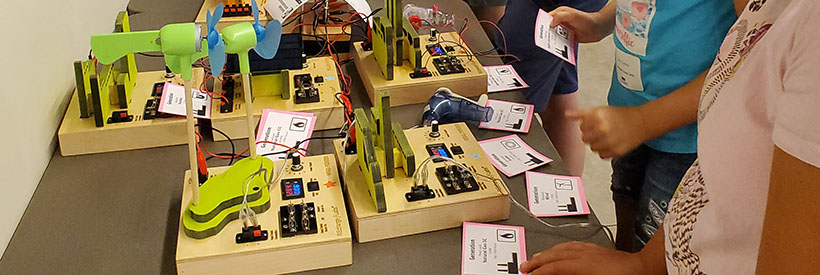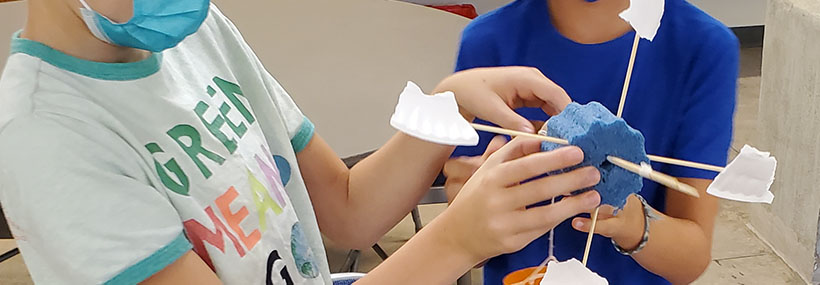
How can I Borrow a Solar Energy Classroom Kit?
To request a kit, please complete the form below. If you are not sure what kit would serve your needs best, please feel free to email case@jmu.edu and one of our staff is happy to help you plan your energy module using the most effective kits/activities.
Solar Thermal Energy Classroom Kits:
NEED Radiation Cans
Students will learn about how the sun can warm air and water using these radiation cans. The kit also comes with thermometers and can include flat or concave mirrors for solar concentrating experiments as well. These supplies are used with the NEED solar curriculum guide for intermediate grades.

Pizza Box Solar Oven
The pizza box solar oven can reach temperatures of 275 degrees Fahrenheit, hot enough to cook food and to kill germs in water. A general rule for cooking in a solar oven is to get the food in early and don’t worry about overcooking. Solar cookers can be used for six months of the year in northern climates and year-round in tropical locations. Expect the cooking time to take about twice as long as conventional methods and allow one half hour for preheating. You may want to try making s'mores (graham crackers with melted marshmallows and chocolate) or English muffin pizzas, or something that you can eat even when it’s raw!
Solar Parabolic Cooker
The sun is a wonderful (and free) source of energy just waiting to be harnessed. You can build a simple solar parabolic cooker for use on a sunny day. The focus of a parabola is a point that lies along the axis of symmetry and acts as the special point around which a parabola (or any other geometric shape) is constructed and it can be used to concentrate the sun's energy for cooking. This kit consists of simple materials needed to build this alternative solar cooker.
The Solar Distiller
The solar distiller is a simple activity where students can use the sun's energy to clean water. The kit includes simple materials needed to construct the device. This activity comes from the NEED solar curriculum.
NEED Temperature and UV Beads
This kit and activity come from the NEED solar curriculum. In this activity students will experiment with UV beads that change color in sunlight to see how they react at different temperatures.
Renewable Energy Technician
Career kits aim to give students exposure to the job-specific hardware and equipment used in jobs in the renewable energy industry. This kit has the equipment that wind turbine service technicians use to climb wind turbines and work on the generator and other parts of the turbine and solar installers use to work on roof mounted solar systems. Encourage students to try the equipment on, handle the tools, and watch the interviews.
PV Solar Energy Classroom Kits:
Solar Energy Relay Game
The solar energy relay game is an introductory activity for younger students to understand how solar photovoltaic cells generate electricity. It is essentially a controlled game of tag where students representing photons transfer their energy (tag) students representing silicon atoms with an extra electron (nerf ball). Once tagged the silicon students release their extra electron into an empty bin. When the bin fills up the light bulb is powered.
We Share Solar Solar Suitcase
The solar suitcase is a unique opportunity for students to build a solar powered device that can be used to power light bulbs as well as charge cell phones. Each Suitcase kit (we have four in the library) comes with everything required to build a stand-alone 12-volt DC solar power system. It includes a full-color assembly and commissioning guide with written and visual step-by-step instructions as well as all the needed tools.

Solar Panel Experiments
The Solar Panel Experiments kit allows students to conduct a series of controlled experiments where only one variable is changed to learn more about how solar panels are sited. The worksheet asks students to make a hypothesis about each experiment and then reflect on the results. Results can also be related back to seasons, geography, and solar system concepts.

Solar Town
Students will work to build their own Solar (and wind) Houses, then join together to connect them into a Solar Town. Students will also engage in the Solar Scavenger Hunt to understand how solar panels work and how to make them operate most efficiently. Students will apply this knowledge and use basic electrical engineering skills to design and build an electrical system that is powered by their solar panel or wind turbine.

KidWind Labs Solar Fountain
Students will use solar panels to power a small water pump and build a functioning fountain. In doing so, they will learn how a solar panel works, collect data, and test variables as well as apply their observations to their engineering process as they improve their designs.

KidWind Labs Solar Cork Boats
Students will use solar panels to power a small motor and propel a boat made of cork. Students will learn basic solar circuitry to connect a motor to the solar panel, then use simple engineering design to make paddles that propel the boat as far and as fast as possible. Solar panels and motors are rugged and built for repeated classroom use.
Renewable Energy Classroom Kit Categories:
You may find addtional classroom kits at our 4H satellite locations.
How can I Borrow a Classroom Kit?
To request a kit, please complete the form below. If you are not sure what kit would serve your needs best, please feel free to email case@jmu.edu and one of our staff is happy to help you plan your energy module using the most effective kits/activities.



